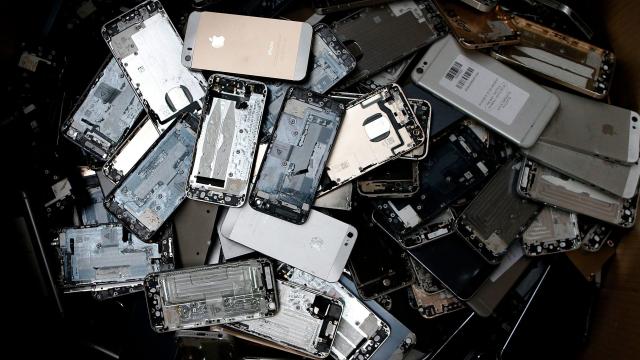While conducting an interview for this very blog, my phone started to die rapidly. My iPhone is a couple years old, and its battery isn’t what it once was. The logical solution, of course, is to replace the battery because the rest of the device is working fine. But Apple doesn’t make that easy. The company places strict restraints on independent repair shops, encouraging customers to get their batteries replaced at Apple stores, which charge over $120 instead.
This isn’t just annoying and costly for consumers. It’s also a huge environmental concern. But doesn’t have to be this way. Companies could produce products that are built to last and give users the right to repair their own devices, a solution that could keep the growing pile of electronic waste from overflowing.
Electronic waste, or e-waste, is the fastest growing trash stream in the world. Americans dispose of an estimated 416,000 cell phones every day. Only about 20 per cent of e-waste gets recycled; most of it goes to landfills, releasing toxic pollutants into waterways, soil, and the air. Making products that are near-impossible to repair also encourages more production, which releases tons of climate-warming carbon.
Despite this, companies continue to prevent consumers from repairing their devices on the cheap and making devices that die too fast. Apple has some of the “least repairable” tech products on the market, but they’re not alone. Nintendo, for instance, has made it impossible to replace the joystick on Switches, forcing consumers to buy new controllers. And starting next month, Nikon won’t allow independent repair shops, making it harder for consumers to fix their broken cameras. Somehow, this is all perfectly legal despite screwing consumers and the planet.
“This is really a problem of monopoly control,” Daniel Hanley, policy analyst at Open Markets Institute, told Gizmodo. “These companies take overt actions to make repair impossible.”
In a new report Hanley co-authored, Open Markets Institute argues that the best way to break this cycle of frustration and pollution is tighter regulations. Lawmakers and regulators can harness the power of antitrust law “to reopen repair markets and rebalance power among dominant corporations, independent repair shops, and consumers.”
Existing antitrust law and legal precedent could also be used to challenge how companies use warranties. Some companies have moved to void warranties for items consumers have attempted to repair themselves even though a 1975 law prohibits them from doing so.
“The [Federal Trade Commission] could be enforcing that, but they’re choosing not to,” Hanley said.
It’s unclear where the Trump administration stands on these protections. In 2018, the U.S. Library of Congress ruled that consumers and independent repair can use third party software to maintain devices, and the U.S. Federal Trade Commission held a workshop on right to repair last July.
Enforcing antitrust regulations in general is down at the federal level. Meanwhile, odds for Congressional action on right to repair legislation in the U.S. are slim, though it has been endorsed by Bernie Sanders and Elizabeth Warren while they were running for president.
This action may not all have to happen at the federal level in the U.S., though. Twenty U.S. states are considering enacting right-to-repair laws, and Massachusetts may soon be the first state to enshrine these principles.
Of course, right to repair rules won’t completely solve the problem of e-waste even if they do make a dent in it.
“If there are electronics, there’s going to be some e-waste,” said Hanley. “But the problem with how much of the waste that we’re generating is entirely unnecessary, or even more nefariously is, purposely created because of these restrictions. It doesn’t have to be this way.”
